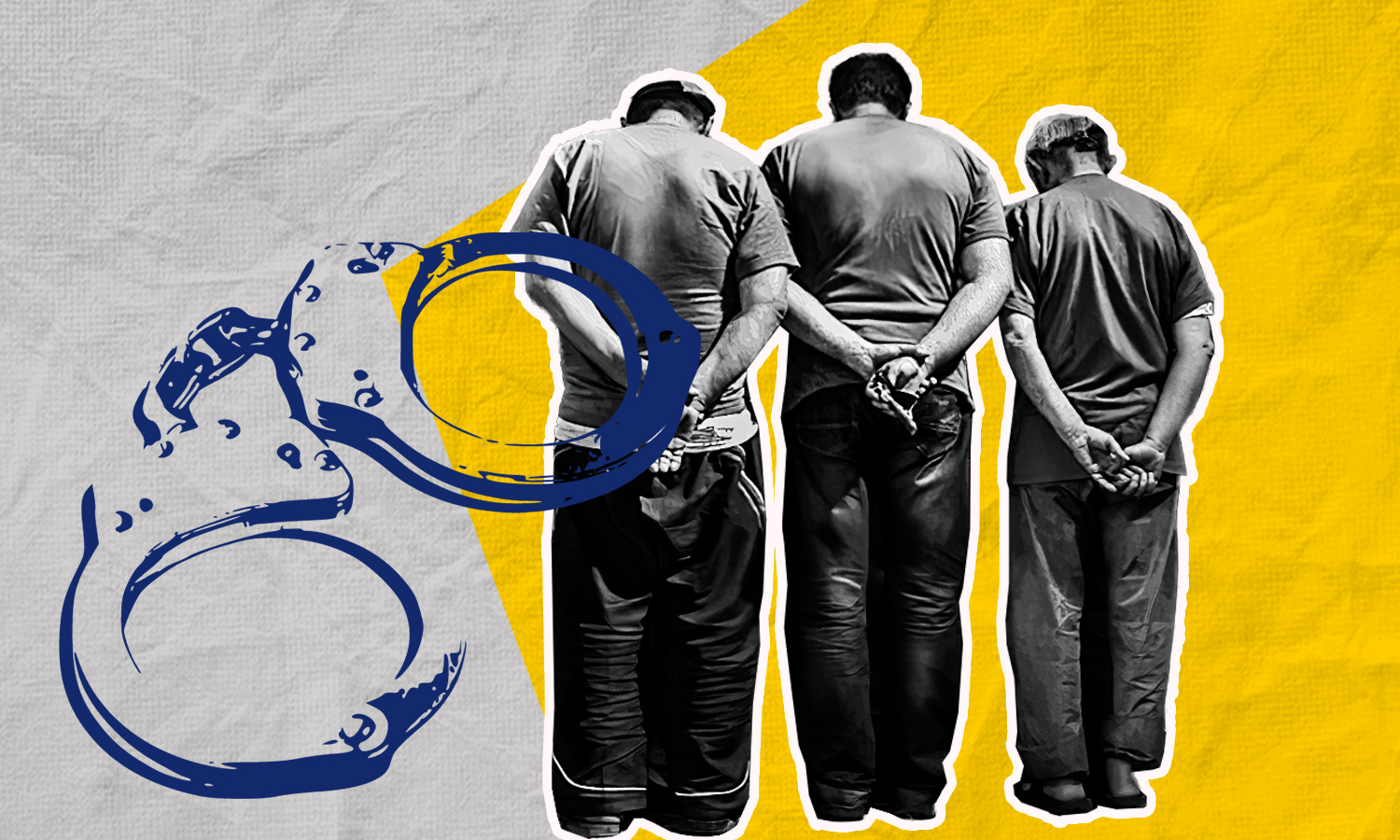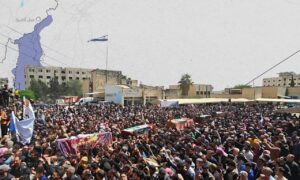Enab Baladi – Saleh Malas
When Bashar al-Assad assumed presidential powers in Syria in 2000, the country was already plagued by a heavy legacy of human rights violations. Yet, al-Assad has not taken any serious steps to acknowledge or address these violations, nor has he given any information about the fate of thousands of people who went missing during the reign of his father, Hafez al-Assad.
By copying his father’s authoritarian approach and dictatorial policies, the younger al-Assad will rule Syria for a fourth seven-year term until 2028.
Confirming the systematic behavior of the regime with its dissents, Bashar al-Assad enacts more laws and regulations that would make the human rights community in Syria fragile and isolated and that would protect the political authority from any public criticism or accountability for its actions.
On the other hand, families of detainees and human rights defenders are actively working to find mechanisms or ways to release the detainees, access information about the forcibly disappeared persons, and know the fate of the remains of persons killed under torture, start the process of determining what happened to them, rather than pursuing prosecutions and other longer-term justice processes.
In this in-depth article, Enab Baladi discusses how much Syrian organizations rely on a mechanism to meet their goals, at a time when the file of Syrian detainees has turned into a pressure card in the hands of the state actors in Syria— using this card in negotiations to reach an agreement or a political settlement— and amid an absence of an environment fostering the rule of law and human rights, which can consolidate the work of human rights organizations within Syria, seeking to gain access to the broadest range of information about detainees.
In desperate search of answers
Last May, in efforts to safeguard the rights of detainees and forcibly disappeared persons and ensure justice for them, five Syrian associations, formed by survivors, victims, and their family members who have suffered markedly by various perpetrators in Syria since 2011 and before, developed the Truth and Justice Charter, aimed at finding any mechanism to address the issue of the disappeared and detained.
The charter was founded by the Association of Detainees and Missing Persons in Sednaya Prison, Caesar Families Association, Coalition of Families of Persons Kidnapped by ISIS (Massar), Families for Freedom, and Ta’afi Initiative.
The charter calls for a new urgent mechanism. This mechanism should immediately begin work on identifying ways to get the detainees released from custody, based on the charter’s objectives.
Any such mechanism then must be victim-centered, focused on getting the detained released, finding the locations of the detention facilities, which are increasingly spread all over Syria, finding the remains of those who are killed, and figuring out what happened to them.
The charter co-founders regard the document as “evidence” before the UN or the EU, that such a mechanism can be established.
The charter also argues that a mechanism could be created by the UN, the EU, or several states. And should this mechanism be established outside the UN framework, it should have a board made up of representatives of the International Committee of the Red Cross (ICRC), the International Commission on Missing Persons (ICMP), UN Working Group on Arbitrary Detention (WGAD), and UN Working Group on Enforced or Involuntary Disappearances (WGEID) and one or two from Syrian groups elected annually to represent victims and survivors.
The charter’s co-founders believe that such a board could help to make the proposed mechanism more skilled, inclusive, and legitimate, regardless of whether it is set up by the UN or not.
The goals of the mechanism are the core of the charter, which, issued last February, guarantees a shared vision between groups of victim organizations.
The five associations understand the difference between short-term justice and long-term justice. In short-term justice, immediate measures must be taken to stop the ongoing violations and alleviate the suffering of survivors and victims and their families.
Long-term justice involves lengthy and complex judicial procedures to ensure comprehensive fairness and non-recurrence of violations. In other words, accountability must eventually take its course.
Notably, justice measures taken against different parties to the conflict in Syria have seen several developments, since the first trial in the world was held in Germany on murder under torture and rape in the detention facilities of the Syrian government.
Currently, the five Syrian organizations’ immediate priority is to obtain information as to the fate of the detainees.
According to the charter, the sooner efforts begin to trace the fate of the victims—even if the conflict is still ongoing—the lower the risk of tampering with evidence will be.
In addition, killings in Syria’s detention centers continue, and the longer the process of gathering information to search for detainees and seek their release, the more difficult it will be to find them alive.
The charter, therefore, insists that a new mechanism must immediately begin collecting all existing information from bodies and organizations that dealt with detainees and the disappeared’s rights, gathering existing and new information about places of detention and sites of mass graves in Syria in addition to creating a map.
In January 2014, the Syrian defector and photographer known as Caesar published 55,000 photos of the dead bodies of detainees killed under torture in the detention centers of the Syrian regime.
Later in March 2015, the Syrian Association for Missing and Conscience Detainees published thousands of photos of the victims killed in prisons. Thus, families started to search for the fate of their children through these many photos, according to a report by Human Rights Watch, which verified Caesar’s photos’ authenticity.
These photos have become almost the only source for finding out the fate of the detainees after the Syrian authorities deliberately concealed their fate, and whether they were alive or killed under torture.
Who adopts “Short-Term Justice”?
To act upon the wishes of victims’ families who desperately want to know the fate of their loved ones, there must be a body with international standing and a humanitarian mandate, to determine the scope of the authority and influence that the mechanism will have, especially the power to bind states to cooperate in the detainees’ file and to impose settlements in the interests of their rights.
However, “there are no guarantees at all” offered by any UN group to sponsor the establishment of this mechanism, the director of Ta’afi Initiative, Ahmad Helmi, told Enab Baladi.
“There is international momentum and desire to present the file of detainees and forcibly disappeared persons in parallel and as a result of constant pressure from all activists, organizations and human rights defenders,” according to Helmi.
The main driver of any international interest in following up on violations in Syria is based on the efforts of Syrian activists concerned with these issues only.
When activists exert more pressure on international bodies by focusing on and publicizing the issues of detainees and forcibly disappeared persons, the international community will be able to see that there can be no political solution or security stability in Syria without guarantees for the release of detainees.
Violations are not an obstacle to a political settlement
The authority in Syria has a record of showing a consistent policy of suppressing any opposition by arresting its members, regardless of international or regional developments or the nature of its relations with the international community.
When former Lebanese Prime Minister Rafik Hariri was assassinated in 2005, Syria suffered a state of diplomatic isolation after accusations were made against the Syrian regime for carrying out the assassination. At the same time, al-Assad was launching arrest campaigns against those opposing him or holding cultural gatherings and forums that called for political changes and a trend towards freedom in criticizing the authority.
However, this diplomatic isolation of Syria was broken in 2009 by the renewal of relations between the Syrian regime and the international community, which did not positively affect Syria in the field of human rights.
After 2011, the files of Syrian detainees were first brought to the table in Geneva talks, from which UN Resolution 2254 came out. The resolution stipulates the release of detainees, especially women and children.
But due to the lack of progress in the Geneva peace talks on Syria, in 2017, Turkey, Iran, and Russia sponsored a series of parallel peace talks in Astana.
The director of Ta’afi Initiative, Ahmad Helmi, pointed out that “Expectations are not high” for the Astana process is the only political process left after the failure of the Geneva process, to achieve the release of detainees.
The UN-founded Working Group for Arbitrary Detention (WGAD) did not achieve any “progress” regarding the rights of the Syrian detainees within the process. This is partly because the WGAD does not have a Syrian party. Therefore, the WGAD deals with the issue of Syrian detainees as if they were prisoners of war, which is categorically rejected by Helmi.
Since the start of the political process in the third round of the Syrian Constitutional Committee meetings in Geneva, and through all the rounds that are supposed to be indirect negotiations with the regime, the detainees’ file has been presented in all sessions as “beyond negotiation.” This is because it is stipulated in the humanitarian agenda items of resolution 2254 that the detainees must be released as a short-term strategy, and the fate of the forcibly disappeared persons must be uncovered to build confidence between the two parties before reaching any political settlement, Alice al-Mufrej, who is responsible for the detainees’ file in the Syrian High Negotiations Committee, told Enab Baladi.
She added, “We achieved nothing but failure,” for the political process of Geneva was derailed to the endless Astana rounds. Furthermore, the detainees’ file was undermined within the framework of interest-based exchanges, with regional consensus and international blessings that were manifested with UN participation.
Consequently, the Syrian file has been diluted despite all the efforts and huge work made with international decision-makers and international institutions to achieve any progress towards holding an international conference on detainees and building a central bank for documentation through coordination between the political and civil courses as an infrastructure, according to al-Mufrej.
When the constitutional committee started its work, the file of detainees and forcibly disappeared persons became politicized. Releasing detainees needs a binding international will. The failure to make any positive progress in the file of detainees is because the active states in the Syrian affairs put their interests ahead at the expense of the file. This failure has nothing to do with the fact that the file was not thoughtfully presented in the political process, as it began with “failure, our presence in Geneva remained as a strategy of resistance to keep the whole process alive,” according to al-Mufrej.
Reporting channels open for the families of the disappeared and detainees
The charter of the five Syrian associations presented the international channels through which Syrian people can report the detention or the enforced disappearance of their relatives.
In a non-free country like Syria, there are no functioning national-level channels for people to report and obtain information about their missing and disappeared loved ones. Eventually, attempting to seek information or making missing person reports in a country like Syria exposes the family members to threats of detention and other abuses.
Therefore, some families resort to Syrian or international NGOs to report cases of arrest and enforced disappearance. Practically. There are only four international channels available:
- The International Committee of the Red Cross (ICRC)
- The International Commission on Missing Persons (ICMP)
- UN Working Group on Arbitrary Detention(WGAD)
- UN Working Group on Enforced or Involuntary Disappearances (WGEID)
However, none of these NGOs are currently capable of dealing with the cases of missing persons and detainees who cannot be found in Syria.
Working behind closed doors
The announcement of this project shows an effort to verify information about the detainees and their release instead of waiting for justice to be achieved through judicial trials. The director of the Washington-based Syria Justice and Accountability Center, Muhammad al-Abdullah, said that it is “very frustrating” that the families of the victims concluded that international justice mechanisms “will go no where, and will not be able to help families know the fate of their loved ones.”
“First, we must choose clearly and precisely what we want from this mechanism. We should identify the nature of the mechanism and its goals because by clarifying the purposes of the mechanism, the odds of the mechanism’s success will become more apparent,” al-Abdullah told Enab Baladi.
He differentiated between the mechanism’s work as a human rights advocacy platform and its work behind closed doors.
Suppose the mechanism aims to raise awareness of the necessity to address the issue of the Syrian disappeared and detainees more seriously and to find new ways to mobilize this issue in the UN channels; moreover, suppose it reaches a significant number of organizations and countries concerned and supportive to limit violations of the detainees’ rights in Syria and puts pressure on the Syrian regime and its main ally Russia to move seriously towards solving the issue of the disappeared and detainees. In that case, this means that the mechanism adopts advocacy as a platform in its work.
However, the advocacy mechanisms do not necessarily obtain an entry permit to Syria or the possibility of inspecting prisons, nor do they necessarily get tangible positive results, such as the release of a detainee, according to Al-Abdullah.
An example of the organizations following the advocacy mechanisms and strategies are the Independent International Commission of Inquiry on Syria (IICIS) and International, Impartial and Independent Mechanism for Syria (IIIM). These two bodies do have permission to enter the detention facilities in Syria, except through Chapter VII of the Security Council. This cannot happen with the presence of the Russian veto.
These bodies are specialized in investigating crimes against human rights in Syria in order to use their reports and information as evidence in prosecuting individuals accused of committing violations.
And establishing a mechanism to issue advocacy statements and work with the UN without entering Syrian prisons is viewed by al-Abdullah as “a return to square one,” because it will not achieve the goals of the victims’ families of knowing the fate of their relatives.
Nevertheless, if this mechanism relies on working behind closed doors, it will take the path of searching for information without the public aspect of advocacy and issuing statements.
This mechanism suggests direct dialogues and discussions with the Syrian government and often with its ally Russia to present some solutions and suggestions, such as entering some prisons, releasing some detainees, learning the fate of those killed under torture, or finding their remains.
This kind of mechanism does not play an influential role in advocating the issue of Syrian detainees because the discussion with the Syrian regime will not be fruitful.
The ICRC is considered the most effective human rights organization in this role because it has access into Syria through its office in Damascus, which operates from the Lebanese capital, Beirut. Besides, it has a permanent representative in northeastern Syria with the approval of the Syrian government.
The ICRC was allowed to enter the Damascus Central Prison in the suburb of Adra and communicate with detainees there. Its work and support can be expanded further by mobilizing political action behind it, al-Abdullah said.
This can happen only if there is no split in the public advocacy to ensure that it has more access to the rest of the detention centers and prisons in Syria to obtain information.
What distinguishes the work of the ICRC is that it is strictly confidential, and there is great secrecy over the information it obtains. The ICRC does not share its information with any party, whether human rights, international, judicial, or parliamentary bodies. Rather, its commitment is only with the families of the missing, which allows them to access information about the condition of their relatives only, and they do not provide information about the prison in general.
Accordingly, the ICRC does not play the role of the witness by transmitting violations to the courts to use that information to prosecute those accused of war crimes or crimes against humanity in Syria. This can achieve the families’ goals, who are eager to obtain any piece of information about their loved ones and hand over the remains of those killed under torture.
if you think the article contain wrong information or you have additional details Send Correction
النسخة العربية من المقال
-
Follow us :












 Detainees in the Syrian regime prisons(Enab Baladi)
Detainees in the Syrian regime prisons(Enab Baladi)





 A
A
A
A
A
A








 More In-Depth
More In-Depth